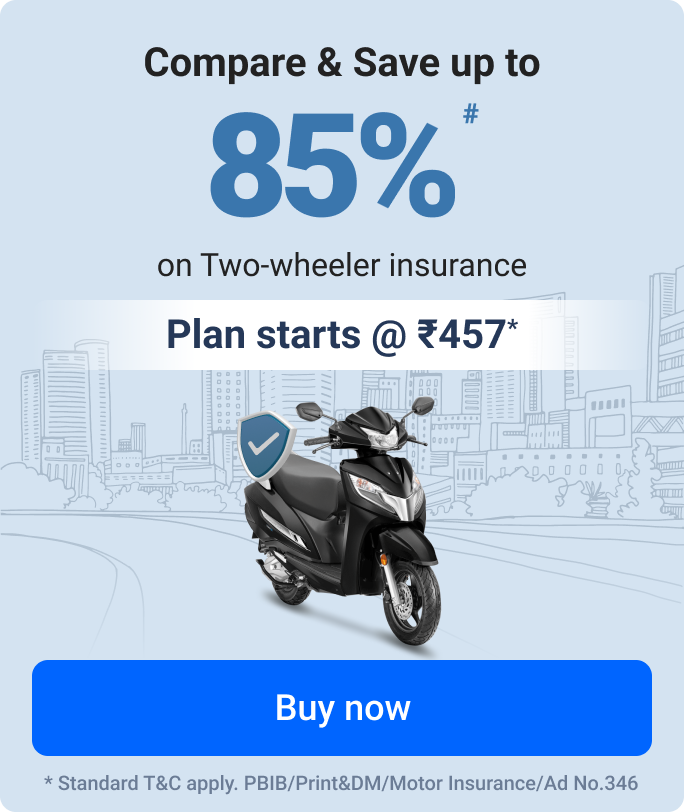How to Raise Scooty Insurance Claims?
Riding in your scooter (commonly referred to as scooty) around your town is a breeze until any unforeseen circumstance hits you. Whether it is a fender bender or a more serious accident, knowing how to claim your scooty insurance can make your task easier. On this page, you will learn about the claim settlement process under your scooty insurance policy and how to get back on two wheels quickly.
Types of Scooty Insurance Claims
Under your scooter insurance policy, you can raise two types of claims explained below:
- Own Damage Claim: As the name suggests, the OD claims under your scooter insurance policy it cover damages to your own scooter due to theft, fire, accidents, natural disasters, or man-made calamities. It assists you in repairing and replacing damaged scooty due to these unforeseen risks.
- Third-Party Claim: This covers your legal and financial liability if you cause damage to someone else's property or injure them while riding your scooty on the public road.
Steps to Claim Scooty Insurance in Case of an Accident
Here is how you can raise a scooter insurance claim in case of an accident:
- Step 1: Inform the Police: Visit the nearest police station and file an FIR (First Information Report).
- Step 2: Contact Your Insurer: Inform your insurance provider about the incident immediately.
- Step 3: Submit Documents: Submit the filled & submit a claim form along with documents like your scooty's RC, two-wheeler insurance policy, DL, and any other documents asked by the bike insurance companies.
- Step 4: Gather the Evidence: Take clear photographs of the damages caused to the scooty and the accident scene.
- Step 5: Surveyor Assessment: The insurance provider will send a surveyor to the accident site to assess the damages. Cooperate with the team and be transparent with your answers.
- Step 6: Claim Settlement Process: Once the assessment is done, the insurance company will approve your claim and either reimburse you for the repair costs (reimbursement claim) or directly settle the bill with the garage (cashless claim).
Steps to Claim Scooty Insurance in Case of a Theft
Finding your scooty has been stolen can be a distressing experience. To get out of it, follow the below claim procedure in case of theft:
- Step 1: File an FIR: Immediately report an FIR to the nearest police station for theft.
- Step 2: Inform Your Insurer: Contact your insurance company immediately to report the theft. Provide them with your policy details and a copy of the FIR.
- Step 3: Submit Documents: Send the below-mentioned documents to your insurer. However, this might vary from insurer to insurer:
- Copy of your scooty's registration certificate
- Copy of your insurance policy
- Copy of your driving license
- Original keys of the scooty
- Step 4: Police Investigation: Cooperate with the investigation part and provide asked information that might help recover your scooty.
- Step 5: Claim Settlement: If the police cannot recover your scooty within a specified period, the claims will be settled based on the Insured Declared Value (IDV) of your scooty, minus any applicable deductibles.
Steps to Claim Scooty Insurance in Case of a Third-Party
The third-party claim process involves legal aspects and the determination of liability. Therefore, the claim settlement process can be complex. However, here is what you need to do in case of third-party theft claims:
- First Thing First
- Ensure Safety: Prioritize everyone's safety and seek medical assistance if necessary.
- Record Information: Collect details of the third party, including their name, contact information, vehicle registration number, and insurance details.
- Document the Scene: Capture photographs of the accident site and the damages caused to all vehicles and any property involved.
- Inform the Police: File a First Information Report (FIR) at the nearest police station.
- Inform the Insurance Company
Contact your insurance provider immediately to report the accident. They will assist you with the process and provide the necessary forms. - Motor Accident Claims Tribunal (MACT):
In most cases, MACT handles third-party claims. The injured party (or the affected property owner) will file a claim with the MACT. Legal representation is often recommended for this process. - Investigation and Assessment:
The insurance company will investigate the accident to determine liability and assess the extent of the damages. The MACT will conduct hearings to gather evidence and determine the appropriate compensation. - Compensation:
If the claim is approved, the insurance company will pay the compensation amount as determined by the MACT.
Note:
Remember that the specific claim process may vary depending on the accident's circumstances and individual insurance companies' policies.
4 Tips for a Smooth Claim Process Under Scooter Insurance Policy
Incorporate the below tips to ensure a smooth claim settlement process:
- Read your policy document carefully: You need to understand the inclusions, exclusions, and claim process determined by the insurer.
- Be honest and transparent: Refrain yourself from providing wrong or incorrect information to your insurer.
- Keep records: Keep copies of all documents, communication, and bills related to the accident and claim.
- Don't delay: Inform the police and your insurer on time.
FAQs About Scooty Insurance Claims Settlement
-
Q.1 What's covered in scooty insurance?
Ans: The coverage depends on the type of policy purchased. A third-party scooter insurance policy covers damage you cause to others by the insured scooter in a road accident. However, a comprehensive scooter insurance policy covers third-party liabilities plus damage to your scooty from accidents, theft, or natural disasters. -
Q.2 Can I claim for scooty scratches?
Ans: You can raise claims for minor damages with a comprehensive two-wheeler insurance policy. However, you will lose your "no-claim bonus". Therefore, it is advised to avoid raising claims for minor scratches. . -
Q.3 How many times can I claim under scooty insurance?
Ans: No such strict limit exists, but frequent claims will hamper your upcoming premiums to be paid. Also, claiming often will reduce accumulated bonus, i.e. No Claim Bonus (NCB). -
Q.4 What's the cost of scooter insurance?
Ans: Scooty insurance costs depend on various factors, including your scooty's model, age, location, and the type of policy you choose. Get quotes from different insurers to compare.
^The renewal of insurance policy is subject to our operations not being impacted by a system failure or force majeure event or for reasons beyond our control. Actual time for a transaction may vary subject to additional data requirements and operational processes.
^The buying of Insurance policy is subject to our operations not being impacted by a system failure or force majeure event or for reasons beyond our control. Actual time for transaction may vary subject to additional data requirements and operational processes.
#Savings are based on the comparison between highest and the lowest premium for own damage cover (excluding add-on covers) provided by different insurance companies for the same vehicle with the same IDV and same NCB.
*TP price for less than 75 CC two-wheelers. All savings are provided by insurers as per IRDAI-approved insurance plan. Standard T&C apply.
*Rs 538/- per annum is the price for third party motor insurance for two wheelers of not more than 75cc (non-commercial and non-electric)
#Savings are based on the comparison between the highest and the lowest premium for own damage cover (excluding add-on covers) provided by different insurance companies for the same vehicle with the same IDV and same NCB.
*₹ 1.5 is the Comprehensive premium for a 2015 TVS XL Super 70cc, MH02(Mumbai) RTO with an IDV of ₹5,895 and NCB at 50%.
*Rs 457/- per annum is the price for the third-party motor insurance for private electric two-wheelers of not more than 3KW (non-commercial).The list of insurers mentioned are arranged according to the alphabetical order of the names of insurers respectively.Policybazaar does not endorse, rate or recommend any particular insurer or insurance product offered by any insurer. The list of plans listed here comprise of insurance products offered by all the insurance partners of Policybazaar. For complete list of insurers in India refer to the Insurance Regulatory and Development Authority of India website www.irdai.gov.in





























